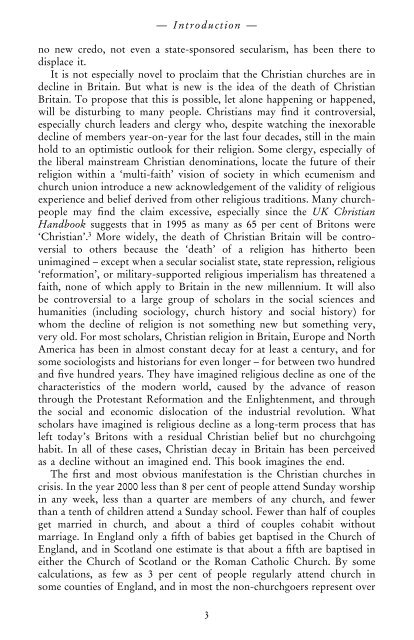The Death of Christian Britain
The Death of Christian Britain
The Death of Christian Britain
You also want an ePaper? Increase the reach of your titles
YUMPU automatically turns print PDFs into web optimized ePapers that Google loves.
— Introduction —<br />
no new credo, not even a state-sponsored secularism, has been there to<br />
displace it.<br />
It is not especially novel to proclaim that the <strong>Christian</strong> churches are in<br />
decline in <strong>Britain</strong>. But what is new is the idea <strong>of</strong> the death <strong>of</strong> <strong>Christian</strong><br />
<strong>Britain</strong>. To propose that this is possible, let alone happening or happened,<br />
will be disturbing to many people. <strong>Christian</strong>s may find it controversial,<br />
especially church leaders and clergy who, despite watching the inexorable<br />
decline <strong>of</strong> members year-on-year for the last four decades, still in the main<br />
hold to an optimistic outlook for their religion. Some clergy, especially <strong>of</strong><br />
the liberal mainstream <strong>Christian</strong> denominations, locate the future <strong>of</strong> their<br />
religion within a ‘multi-faith’ vision <strong>of</strong> society in which ecumenism and<br />
church union introduce a new acknowledgement <strong>of</strong> the validity <strong>of</strong> religious<br />
experience and belief derived from other religious traditions. Many churchpeople<br />
may find the claim excessive, especially since the UK <strong>Christian</strong><br />
Handbook suggests that in 1995 as many as 65 per cent <strong>of</strong> Britons were<br />
‘<strong>Christian</strong>’. 3 More widely, the death <strong>of</strong> <strong>Christian</strong> <strong>Britain</strong> will be controversial<br />
to others because the ‘death’ <strong>of</strong> a religion has hitherto been<br />
unimagined – except when a secular socialist state, state repression, religious<br />
‘reformation’, or military-supported religious imperialism has threatened a<br />
faith, none <strong>of</strong> which apply to <strong>Britain</strong> in the new millennium. It will also<br />
be controversial to a large group <strong>of</strong> scholars in the social sciences and<br />
humanities (including sociology, church history and social history) for<br />
whom the decline <strong>of</strong> religion is not something new but something very,<br />
very old. For most scholars, <strong>Christian</strong> religion in <strong>Britain</strong>, Europe and North<br />
America has been in almost constant decay for at least a century, and for<br />
some sociologists and historians for even longer – for between two hundred<br />
and five hundred years. <strong>The</strong>y have imagined religious decline as one <strong>of</strong> the<br />
characteristics <strong>of</strong> the modern world, caused by the advance <strong>of</strong> reason<br />
through the Protestant Reformation and the Enlightenment, and through<br />
the social and economic dislocation <strong>of</strong> the industrial revolution. What<br />
scholars have imagined is religious decline as a long-term process that has<br />
left today’s Britons with a residual <strong>Christian</strong> belief but no churchgoing<br />
habit. In all <strong>of</strong> these cases, <strong>Christian</strong> decay in <strong>Britain</strong> has been perceived<br />
as a decline without an imagined end. This book imagines the end.<br />
<strong>The</strong> first and most obvious manifestation is the <strong>Christian</strong> churches in<br />
crisis. In the year 2000 less than 8 per cent <strong>of</strong> people attend Sunday worship<br />
in any week, less than a quarter are members <strong>of</strong> any church, and fewer<br />
than a tenth <strong>of</strong> children attend a Sunday school. Fewer than half <strong>of</strong> couples<br />
get married in church, and about a third <strong>of</strong> couples cohabit without<br />
marriage. In England only a fifth <strong>of</strong> babies get baptised in the Church <strong>of</strong><br />
England, and in Scotland one estimate is that about a fifth are baptised in<br />
either the Church <strong>of</strong> Scotland or the Roman Catholic Church. By some<br />
calculations, as few as 3 per cent <strong>of</strong> people regularly attend church in<br />
some counties <strong>of</strong> England, and in most the non-churchgoers represent over<br />
3








